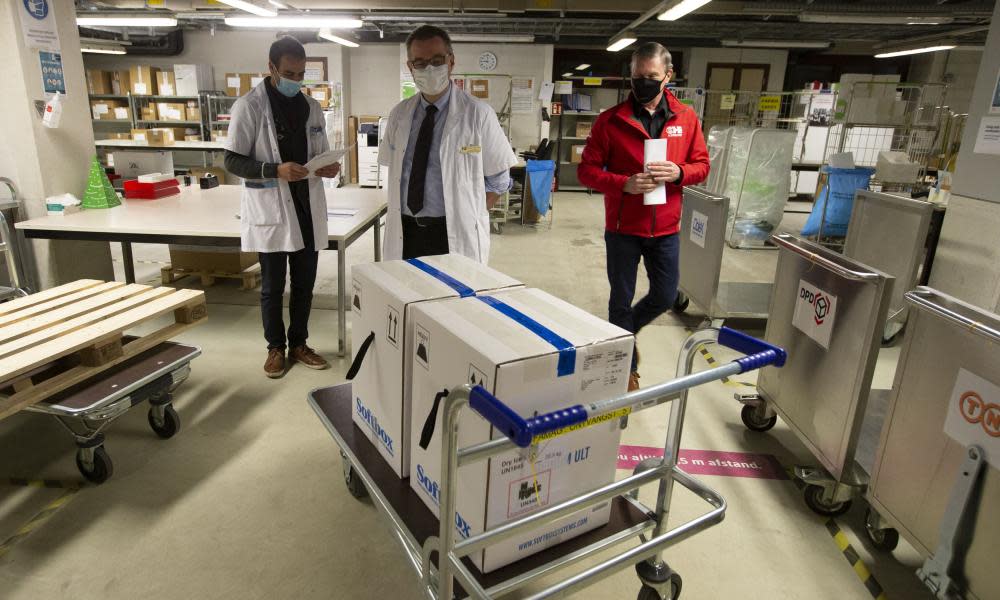Belgium slow to distribute Oxford vaccine doses as Covid cases rise

Two-thirds of the Oxford/AstraZeneca vaccine doses delivered to Belgium have yet to be distributed to vaccination centres, officials have admitted, as the country became the latest in Europe to report a sharp rise in coronavirus infections.
Belgium said infections were up 24% compared with the previous week, at a daily average of 2,300. All age groups were affected except for over-80s, who have been prioritised for vaccinations.
The development appears to be part of a worrying trend for health authorities across the EU, with the European Centre for Disease Control and Prevention (ECDC) reporting that as of last Sunday 13 countries had seen a week-on-week rise in infection rates. Angela Merkel said this week that Germany was heading into a third wave.
The Belgian authorities, among others, are facing growing pressure to explain the slow progress of their vaccine programmes, with just 4.5% of the adult population having had a jab, compared with 27% in the UK. Across the whole of the EU around 8% of the adult population has received a vaccine.
On Friday the Belgian federal medicines agency said that of the 201,600 AstraZeneca doses delivered to the country, only 67,000 had been dispatched to vaccination centres.
Jan Stroobants, the manager of the Spoor Oost vaccination centre in Antwerp, told Belgium’s Radio 1 that the lack of vaccines in his stores was holding him back.
“It surprises me. We are only waiting for the vaccines. For next week our agenda is empty,” he said. “We need a few days to summon people … but there is no point in summoning them if we don’t have vaccines yet, because we might have to call them back. When we are sure we get the rest of the vaccines, we will start giving them.”
Dirk Ramaekers, the head of the Belgian vaccination taskforce, blamed the Anglo-Swedish pharmaceutical company’s erratic delivery schedule for the holdup.
He said: “First of all, there is a lot of uncertainty about the deliveries. AstraZeneca will only announce very late when and how many vaccines they will deliver. And it often involves varying volumes. It has therefore been decided not to start scheduling vaccines until they have been effectively delivered.
“So the vaccination centres cannot send out invitations until they know how many vaccines they will receive and when. To give everyone enough time to schedule such an appointment, we count on a lead time of two weeks between delivery and the effective application of the vaccine.”
AstraZeneca has been forced to heavily cut deliveries to member states in the first quarter of this year owing to a lower than expected yield from its European production sites. Of the 120m doses due, only around 40m are expected to arrive.
But in light of the infection surge, questions are being raised as to why only 27,946,395 of the 38,669,316 vaccine doses delivered by suppliers to member states have been administered.
The discrepancy appears to be partly caused by a lack of administration of the AstraZeneca vaccine. Using data extracted from the European Centre for Disease Prevention and Control (ECDC) and other official sources, it is estimated that 4,849,752 of the 6,134,707 AstraZeneca doses distributed among the 27 member states have not yet been administered. The Guardian revealed on Thursday that Belgium had received 201,600 AstraZeneca doses but had administered just 9,832 (4%).
In an interview with a German newspaper this week, Merkel said the AstraZeneca vaccine had an “acceptability” problem among some circles, following a slew of bad publicity including Emmanuel Macron’s unsubstantiated claim that it was “quasi-ineffective” for older age groups.
But a failure of logistics is increasingly been cited as a further issue in the rollout, by people involved in programmes in a number of member states. According to data from the ECDC, which may be subject to a reporting time lag, Hungary had administered 44.6% of its total vaccine stockpile as of Friday, the Netherlands 64.4% and Belgium 65.5%.
On Friday following a meeting with senior politicians and health officials, Belgium’s prime minister, Alexander De Croo, said he had hoped to announce a relaxation of the national lockdown but that the extent of the infection was too grave.
“We did not make the decision in the consultation committee that we thought we would take,” he said. “The corona situation remains extremely delicate. We were on a high plateau, but the figures are now rising again. The infections, but especially the hospital admissions too. The numbers are rising everywhere and that forces us to remain particularly cautious.”

 Yahoo News
Yahoo News 
